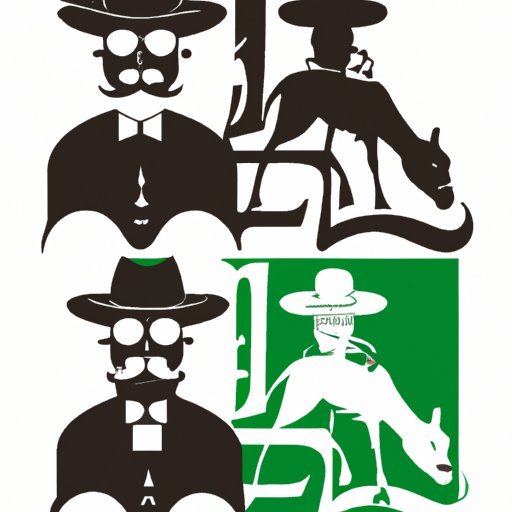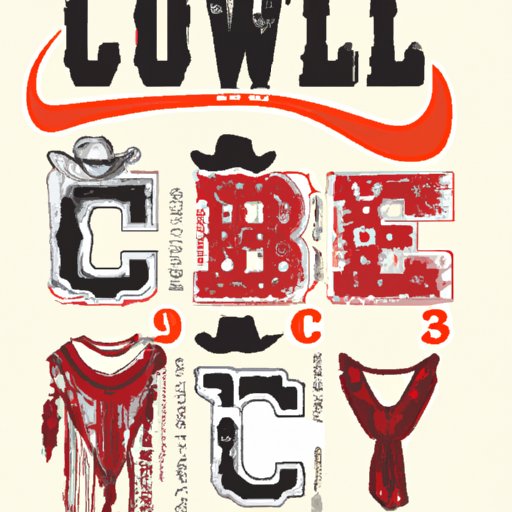Introduction
Cowboy culture is a staple of American identity, and it has had a profound impact on the country’s history, economy, and society. From the Wild West to modern times, cowboy culture has evolved and taken on different forms, but it remains a key aspect of American culture. This article will explore the roots and evolution of cowboy culture, its impact on American life, and its significance to this day.
Discovering the Roots of Cowboy Culture: A Historical Account
The history of cowboy culture dates back to the 1800s, when Americans began moving westward and settling in territories that would later become states. Cowboys were key figures in these settlements, as they were responsible for driving cattle across the plains and delivering them to markets. This required a special set of skills that included riding and herding cattle, and it demanded a particular way of life that revolved around horses, guns, and frontier living.
Influences on cowboy culture came from many sources, including Spanish vaqueros, Native American horsemanship, and the rugged terrain of the Wild West. Cowboys had to be self-reliant and adaptable, and they developed their own way of speaking, dressing, and behaving based on their experiences and needs.
The Evolution of Cowboy Culture: How It’s Changed Over Time
Over time, cowboy culture has changed in many ways, reflecting changes in American society as a whole. One significant development has been the clothing and gear worn by cowboys. While traditional cowboy attire usually includes a hat, boots, and jeans, modern cowboys may also wear flannel shirts, vests, and leather jackets. This reflects the influence of different styles and trends, as well as the practicalities of modern ranching and rodeos.
Technology has also had an impact on cowboy culture, as modern cowboys use tools such as trucks, trailers, and cell phones to do their jobs. This has made it easier to move cattle and stay in touch with fellow cowboys, but it has also changed the way cowboys interact with the land and the animals they work with.
The Modern Day Cowboy: What Cowboy Culture Means Today
Despite these changes, cowboy culture remains an important part of American life, and it continues to be defined by certain values and beliefs. For many, being a cowboy means living by a certain code of conduct that emphasizes hard work, honesty, and respect for others. Cowboys are often seen as independent, strong-willed individuals who are unafraid of danger and committed to their work.
In modern times, cowboys can be found in many different industries, including ranching, rodeo, horse training, and even music. These contemporary cowboys share many of the same traits as their ancestors, but they have adapted to new challenges and opportunities.
Cowboy Culture and the American Identity: A Connection Through Time
There is a strong connection between cowboy culture and the American identity, as cowboys have been featured in American popular culture for over a century. Cowboys can be seen as symbols of freedom, individualism, and toughness, and their stories have been featured in countless books, movies, and TV shows.
Moreover, cowboy culture has played an important role in shaping American society itself, as cowboys were instrumental in settling the Western territories and establishing a new way of life. Cowboys were known for their work ethic, their resourcefulness, and their commitment to family and community. These are values that have played a prominent role in American history and continue to be cherished by many.

Legendary Cowboys of the Wild West: Icons of Cowboy Culture
Several cowboys have become legendary figures in American history, thanks to their exploits and achievements. Names such as Buffalo Bill Cody, Wyatt Earp, and Billy the Kid are still well-known today, and their stories have been told and retold in countless ways. These legendary cowboys have become icons of cowboy culture, and they continue to inspire and fascinate people around the world.
Beyond these famous names, there are many lesser-known cowboys who have also contributed to cowboy culture. Foremen, wranglers, and cowhands have all played important roles in the working of ranches and cattle drives, and their stories and experiences are just as valuable as those of the more famous cowboys.
The Art of Rodeo: A Reflection of Cowboy Culture
Rodeo is perhaps the most recognizable form of cowboy culture, and it has a long and rich history dating back to the 1800s. Rodeos were originally events where cowboys could showcase their skills and compete against one another, and they gradually evolved into a full-fledged sport of their own.
Today, rodeos draw participants from all over the country, and they feature events such as bull riding, steer wrestling, and barrel racing. Rodeo is not just a sport, however—it’s also an art form that reflects cowboy culture in many ways. Rodeo clowns, announcers, and judges are all part of the rodeo world, and they contribute to the unique and vibrant culture surrounding this sport.
From Cattle Drives to Music Festivals: The Diverse Influences on Cowboy Culture
Cowboy culture has been shaped by many different influences over the years, and it continues to evolve to this day. Western folklore has played a significant role in shaping cowboy culture, and this can be seen in the music, poetry, and literature that celebrate the cowboy way of life.
Modern media has also had an impact on cowboy culture, as movies, TV shows and social media platforms have helped to preserve and promote this unique way of life. Cowboy culture is now celebrated in various music festivals, art shows, and cultural events around the country, and it continues to inspire and unite people of all backgrounds.
Conclusion
Cowboy culture is an integral part of American identity, and it remains a relevant and cherished way of life to this day. From its humble beginnings on the cattle drives of the Wild West to its modern-day manifestations, cowboy culture has evolved and adapted to new challenges and opportunities.
Understanding cowboy culture is essential to understanding American history, society, and culture, and it provides a window into a unique way of life that reflects the spirit and values of the American people.
(Note: Is this article not meeting your expectations? Do you have knowledge or insights to share? Unlock new opportunities and expand your reach by joining our authors team. Click Registration to join us and share your expertise with our readers.)
